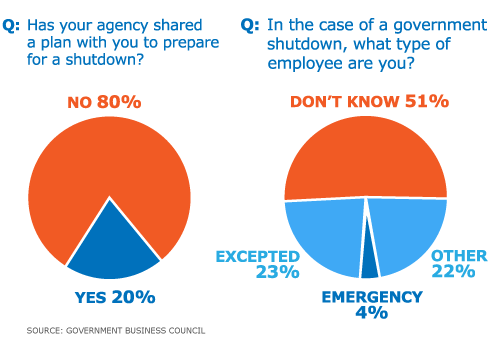Exclusive survey: Feds don’t know whether they'll be furloughed
Looming shutdown hits morale at agencies, with half rating it as "low" or "very low."
A total of 56 percent of the 1,200 people who responded to the survey said their agency had not shared a shutdown plan with them, although almost one quarter -- 24 percent -- expected to receive notification of a plan this week. Many federal agencies began notifying their employees of their respective contingency plans throughout the day on Wednesday.
More than half the respondents said they did not know whether they would have to report to work during a shutdown. Twenty-three percent said they knew they would be excepted from a furlough and would be on the job. Many workers said the lack of information and direction from agency leadership has become frustrating.
"There's been no confirmation," one respondent said. "I'm a little concerned that we're three days away and I have no idea how I should react to the news on Saturday morning. This is becoming a long-term stressor."
The email survey of 1,200 federal managers and employees was conducted by Government Executive's research arm, the Government Business Council, on Wednesday afternoon. Virtually all the respondents were civilian federal employees, covering a host of agencies. More than 27 percent of those who completed the survey worked for the Defense Department or one of the military service agencies. Most respondents indicated they were at the GS-12 level or higher, and nearly half manage one or more direct reports.
The survey showed that agency morale is taking a hit as a result of the protracted budget battle. A plurality of respondents -- 48 percent -- rated morale at their agency as "low" or "very low." Only 13 percent considered their agency's employees to be motivated right now.

"People are working hard to get their work complete before a shutdown occurs, but they feel unappreciated and scared about paying bills," one respondent explained.
One-third of federal managers believed it is likely they will receive retroactive pay for the shutdown period. A full 44 percent were less optimistic and believed it is either "unlikely" or "highly unlikely" that they will receive back pay for the shutdown period. That opinion was echoed on Wednesday by Rep. Jim Moran, D-Va., who said furloughed employees should not expect to receive back pay. Moran's Northern Virginia district is home to tens of thousands of federal workers and contractors.
"Furloughed employees received back pay in 1996, but the political climate was not nearly as polarized and federal employees had not been so thoroughly demonized and dehumanized in the political rhetoric as we have of late," one employee said.
Others were holding out hope that the economic consequences of at least 800,000 federal workers going unpaid, and therefore not spending their money elsewhere, would motivate Congress to provide reimbursement.
"I don't believe Congress can risk the financial fallout from not paying federal employees," a respondent said. "We have mortgages, car payments, utility bills, etc. that will not wait just because inept congressional folks cannot do their job."
A little more than 45 percent of those surveyed said they would cease all use of agency-issued mobile devices, such as laptop computers and BlackBerrys, in a shutdown, with another 40 percent saying their agencies had not provided such devices to them. Nearly half of respondents said they would cease all contact with their colleagues during a shutdown.
If a shutdown occurs, respondents said they would hold Congress most to blame. Survey takers, who were allowed to choose more than one option, pinned most of the fault -- nearly 66 percent -- on congressional Republicans, while almost 51 percent pointed the finger at Democrats. Forty-four percent blamed the Tea Party and 40 percent held the White House responsible.
No matter who is at fault, most agreed federal workers should not be victimized by the stalemate. "Cutbacks are a necessity, I agree," one worker said. "But politicians should not ask the federal workforce to bear the weight of bad decisions made by politicians."
More than 22 percent of respondents identified themselves as Republicans, compared to less than 21 percent as Democrats. The remainder identified themselves as either Independents, from another party, or declined to answer.






